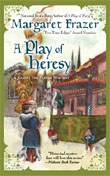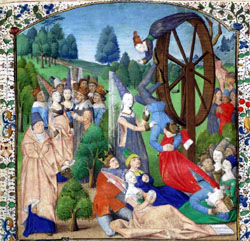CHAPTER 13
A few days followed that were as near ordinary as Joliffe was used to anymore. He worked twice with the young devils for hell’s harrowing. He firmed his lines as Ane and the Prophet into his mind. He strolled out once to see how Tisbe and Ramus were doing where they were pastured outside of Coventry. He spent time with Basset and the others, helping with their cart and gear, Basset having decreed that this while off the road was the perfect time to give a good tending to everything, from greasing the wheels and checking all the underpinnings and harness to laying out every one of their playing properties, to mend those that needed it and dispose of such as were past decent use. Basset set Joliffe and Gil on quest to find and buy what could be used in place of the latter, a quest which diverted Joliffe and Gil for most of a day and gave Joliffe chance to be in places around Coventry for which he might otherwise have lacked excuse…
I’ve said a little bit about Saint Genesius the Actor (otherwise St. Genesius of Rome) elsewhere, but there’s more to be said – as well as adding the fact that there are several Saints Genesius, so you want to be sure you’re invoking the right one, depending on your particular need, right? Especially since I can’t help the suspicion — given the Church’s official stance against players — that St. Genesius the Bishop is the one who makes it rain on outdoor performances of the Genesius Guild’s plays.
Although it is disputed whether he existed at all, if St. Genesius of Rome did live, it was about 300 CE because his story has him martyred during the reign of the Roman emperor Diocletian. It seems that Genesius was a happily pagan actor but became well enough acquainted with Christians to understand their faith. While performing in a play in the emperor’s presence, mocking the Christian rite of baptism, Genesius suddenly converted to belief and acceptance of the faith.
He then proceeded to tell the emperor so.
Diocletian, in return, ordered him tortured. When Genesius still refused to give up his new faith, he was beheaded.
His feast day is August 25, and he is considered the patron saint not only of actors, but of dancing teachers, mountebanks, musicians, and organ-blowers – apparently the sort of people considered fit companions for actors?
Modern additions to this list include lawyers, barristers, and stenographers. I am not going to speculate on this.
St. Genesius, Bishop of Clermont is another sort altogether. For one thing, he is known for certain to have lived. In the first half of the 600s, when Christianity was the accepted religion in Europe, he grew up at Clermont, France, and was (as told in Alban Butler’s Lives of the Saints) “learned, virtuous, and benevolent”, and so beloved in the area that when the previous bishop died, Genesius was unanimously elected his successor by churchmen and common people alike. He really didn’t want the job, even tried to go to Rome to ask the pope to release him from the office, but his people insisted and he became “like a wise father” in the diocese, building a church, a hospice, and a monastery. He died quite peacefully about 660.
Unfortunately for him, a Google search for “St. Genesius” does not bring up a reference to him until the third page. Apparently being certainly real does not compensate for not being an actor and martyr, however possibly fictitious. Now that I think about it, he may have more reasons than one for raining out those plays.
– Margaret
Follow the virtual bookclub for A Play of Heresy on Facebook and Twitter.



 Happily, the age of photography had come before St. Michael’s went.
Happily, the age of photography had come before St. Michael’s went.

 Pictures of Fortuna with her Wheel show a beautifully gowned woman, often crowned, often blindfolded, standing beside a giant, upright wheel in her control. Around the rim, small figures of humans cling. Some are obviously being carried upward toward the top of the Wheel where a richly garbed figure is always perched, an obvious winner who has Made It To The Top. But below him, opposite to the rising figures, are figures clinging desperately, head downward and all too plainly being carried down against their will, while at the Wheel’s bottom are those fallen as far as they can go, ragged and impoverished.
Pictures of Fortuna with her Wheel show a beautifully gowned woman, often crowned, often blindfolded, standing beside a giant, upright wheel in her control. Around the rim, small figures of humans cling. Some are obviously being carried upward toward the top of the Wheel where a richly garbed figure is always perched, an obvious winner who has Made It To The Top. But below him, opposite to the rising figures, are figures clinging desperately, head downward and all too plainly being carried down against their will, while at the Wheel’s bottom are those fallen as far as they can go, ragged and impoverished.












